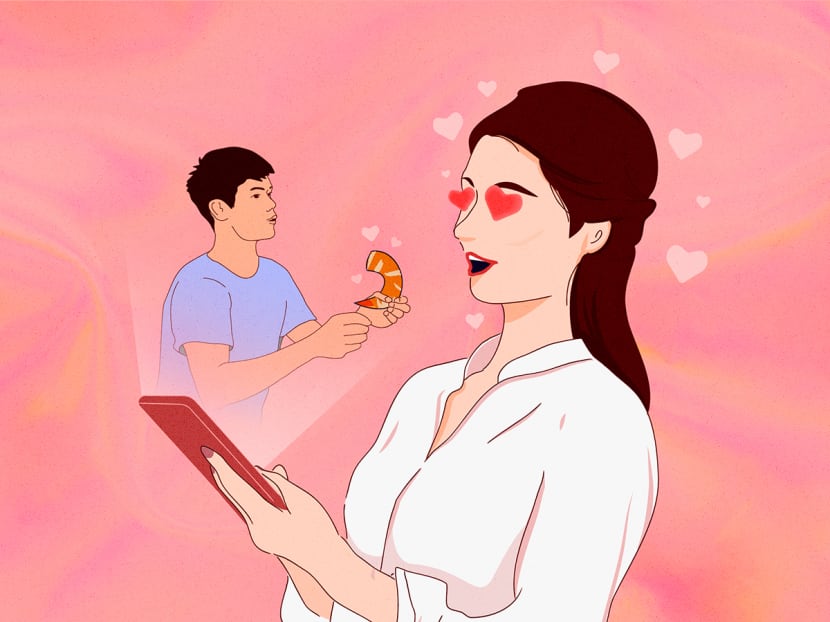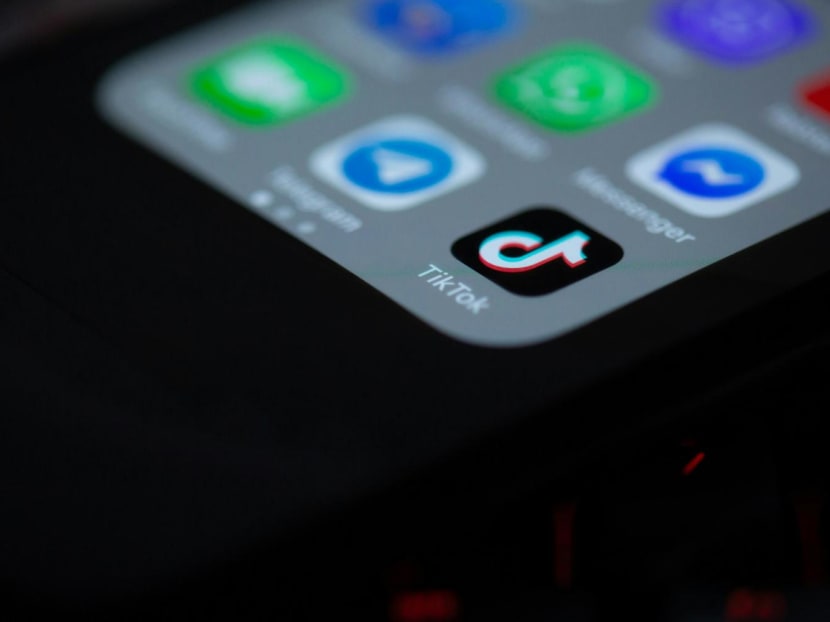Commentary: Looking for advice on dating dilemmas? Don't take TikTok and other social media too seriously
Just a few months ago, women took to TikTok in droves to share videos of themselves testing their partners’ love by asking them to peel an orange.


This audio is AI-generated.
Online content on love and relationships such as the "orange peel theory" can be fun, but if you find yourself routinely turning to social media fads as a real-world litmus test for your partner, perhaps it’s a sign to hit pause and reflect, says this communications strategist.
Just a few months ago, women took to TikTok in droves to share videos of themselves testing their partners’ love by asking them to peel an orange.
It was funny to watch this fad play out — Singaporeans even put their own spin on it by asking their partners to peel prawns instead. But it also makes one wonder how much weight we're putting on these touted ideals when we put our phones down.
Having grown up in the digital age, I've always been drawn to social media for guidance on everything from career to food, and relationships. With just a tap or scroll, we can easily access bite-sized advice tailored to our specific concerns.
In a world where time is of the essence and instant gratification is the norm, the quick fixes offered online are very appealing to modern young adults dealing with relationship dilemmas.
But I’ve begun to notice how toxic Internet dating content can seep into our real lives, subtly perpetuating harmful stereotypes and eroding the foundation of healthy relationships.
For women, such advice often trends towards glorifying jealousy, fixating on superficial signs like texting habits, and equating love with material wealth.
On the flip side, men are fed toxic messaging that discourages vulnerability, pressures them to become dominant “alpha males”, and promotes manipulative tactics like delaying responses to texts.
Take, for instance, the catchy mantra-turned-meme: "If he wanted to, he would." It seems simple — if your partner cared about you, he would act accordingly.
But people aren’t that simple. There are dangers that come with attempting to streamline the complexities of human emotions and motivations into a binary equation such as this.
TRENDING TOWARDS TROUBLE
Food-related challenges, such as the quirky “orange peel theory” and the more recent “ketchup challenge” — which entails cleaning up spilled ketchup on camera — are designed to test a partner's devotion through trivial tasks.
But can we really judge the strength of our relationships based on such arbitrary acts?
Creating unnecessary scenarios just to put our partners on display for public scrutiny and judgement is not only dehumanising but also undermines the trust and respect essential for healthy connection and intimacy.

It doesn’t help that many young adults are already under implicit pressure to measure the success of many aspects of their lives against what they see on social media.
The tendency to compare oneself to others is natural — however, social media amplifies the negative impacts of such comparison, especially among youths who spend a lot of time scrolling through peers' profiles.
For young people, repeated exposure to idealised portrayals of love and dating online can create feelings of inadequacy or insecurity, leading to discontent or disappointment in their own relationships.
Some of my own friends have gotten caught up in replicating “relationship milestones” to the point where it became all about ticking off certain boxes: Posting perfect couple photos, marking anniversaries in unique, flashy ways, or staging elaborate displays of affection.
In chasing these external validations, we risk losing sight of what truly matters: The genuine emotional connection and compatibility we share with our partners.
RETHINKING SOCIAL MEDIA’S ROLE IN YOUR RELATIONSHIP
Popular social media platforms such as TikTok and Instagram run on algorithms that favour viral content. Trends that promote sensationalised or exaggerated relationship advice often pick up steam quickly and easily, quickly racking up millions of views.
But such content often lacks the depth needed to navigate the subjective nature of human relationships.
Snappy catch phrases do well with gaining traction on social media, but don't consider personal struggles, communication barriers, geographical locations, or the fact that everyone expresses love differently.

Perhaps it’s more useful to view catchy phrases and advice soundbites as food for thought.
For example, while TikTok videos of users testing out the orange peel theory saw millions of viewers tuning in, the theory’s popularity seemed to be overwhelmingly limited to girls and women — a group that is typically taught from a young age to prioritise and anticipate others' needs without complaint or concern for our own.
Could it be that a seemingly arbitrary request of peeling an orange isn’t showing us if our partner loves us or not, but rather reflecting our own desire for our unvoiced needs to be met?
SEPARATING SUBSTANCE FROM SOCIAL MEDIA STATIC
In the midst of the noise, how do we discern what's helpful from what's harmful? Here are some tips that I rely on.
Firstly, exercise critical thinking.
Consider the content's tone and approach: Who are they speaking to — a generalised group of people, or a specific type of individual in a specific type of situation? Are they promoting healthy communication and mutual understanding, or do they rely on popular but trite wisdom, or deceptively simple solutions?
Look for sources backed by professionals, such as licensed therapists, or relationship experts with verifiable credentials.
I've personally found a couple of accounts that I really resonate with, like @thesecurerelationship and @your.being. They're run by certified psychologists and relationship experts who offer genuine, evidence-based advice.
Lastly, never underestimate the power of open communication and mutual understanding in relationships.
Regardless of what strangers are saying, the voice that matters most is that of yours and your partner's. Approach conversations with honesty, vulnerability, and a willingness to listen.
In the real world, a relationship between two persons demands open communication and mutual understanding, not snap assumptions based solely on actions prescribed by strangers or digital trends.
Let's leave the oranges and ketchup in the kitchen, and focus on the real, authentic moments that can strengthen our bonds in a healthy way.
ABOUT THE AUTHOR:
Nicole Chan is a communications strategist by trade, and a digital native by passion. Driven by areas where passion meets purpose, she is keen on igniting conversations for topics close to her heart such as intersectionality, DE&I, and sustainability.








